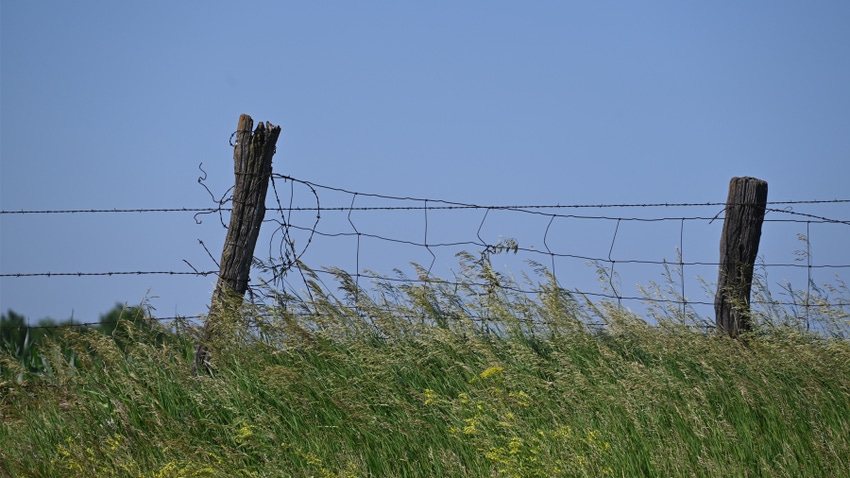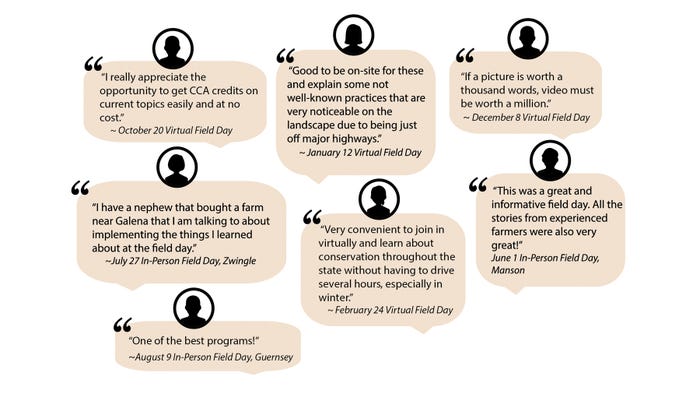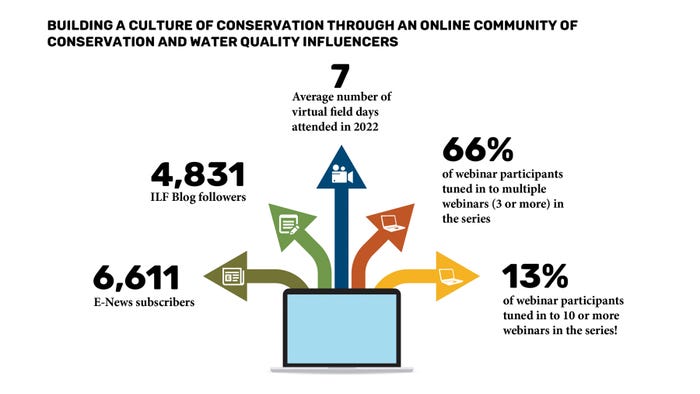June 21, 2023

by Alena Whitaker
In its recently published annual evaluation report, Iowa Learning Farms highlighted a return to pre-pandemic levels of participation in conservation-centered outreach events and noted expansion of programming and success in engaging with underrepresented demographic groups.
Continuing to build a culture of conservation in its 19th year, ILF brings together and builds community among farmers, landowners, agribusiness, researchers and agency partners through a multifaceted approach to outreach which includes in-person field days, virtual field days and weekly webinars. The full report can be found at iowalearningfarms.org/ilf-reports.
“In 2022, we were able to return to our pre-pandemic level of in-person field days while continuing to deliver virtual field days — a concept we pioneered and honed during the pandemic,” says Jacqueline Comito, director of ILF. “Our strong focus on cultivating and promoting relationships with farmers and others who practice and advocate for conservation and water quality improvement was also bolstered through new events and our weekly webinars. Direct engagement with more than 16,500 Iowans during the year illustrates the broad reach and appeal of our programs.”

Field day feedback (Courtesy of Iowa Learning Farms)
During 2022, Iowa Learning Farms:
Hosted 26 in-person field days/workshops and seven virtual field days. Produced 51 webinars, averaging 91 live participants, and drawing 9,220 live and archived views (exceeding 2020 and 2021). Over 97% of webinar participants rated the overall quality of the webinar(s) they attended as “excellent” or “good.” About 95% stated that the webinars were a good use of their time, that they learned new information, and that they learned about new initiatives, resources, and/or tools.
Participated in 77 outreach events such as Conservation Station trailer appearances at county fairs and community festivals, engaging with 7,401 participants.
Continued to expand an online community surpassing 10,000 e-news and blog followers.
True to its mission of listening to the needs of stakeholders, ILF places a strong emphasis on gathering feedback from participants following field days and webinars. In all cases, evaluation responses and data are collected and analyzed to aid in continually improving outreach and programming efforts.

Online participation with Iowa Learning Farms continues to grow. (Courtesy of Iowa Learning Farms)
The report also provides an in-depth look at conservation practice adoption in Iowa, established and emerging trends in implementation of conservation practices and the demographics of those pursuing these solutions most actively. Key findings highlighted in the report include:
Most webinar participants were farmers and landowners, and 66% participated in three or more webinars throughout the year.
Forty-six percent of field day participants who provided feedback indicated that they utilize three or more conservation practices.
Eighty-one percent of respondents who joined virtual field days chose soil health or reduce soil erosion as their top reason for implementing conservation practices.
A slowing of new cover crop adoption, with the percentage of farmers who were trying cover crops for the first time in 2022 (7%) decreased from 2021 (18%).
Increased participation from younger farmers and female farmers and landowners. Some 30% of field day participants were 35 years or younger; and of this group, some 40% were women — up from 28% in 2021.
“All ILF programs are designed to inform and educate utilizing the latest in science and research, but also to listen, promote conversations and gather ongoing feedback that can inform programming changes which better meet the needs of our communities and stakeholders,” Comito says. “Without this feedback loop, we could not be successful in promoting and delivering change. In addition, the feedback provides essential insights for the researchers at ISU [Iowa State University] who continually strive to find answers to the most pressing issues surrounding conservation and water quality today. The ILF Annual Report offers an excellent resource for all who want to learn more about these topics, and we encourage anyone with an interest in conservation to spends some time with the report.”
To view the report, visit iowalearningfarms.org/ilf-reports.
Whitaker serves as water and natural resources specialist with Iowa Learning Farms and Water Rocks.
You May Also Like




